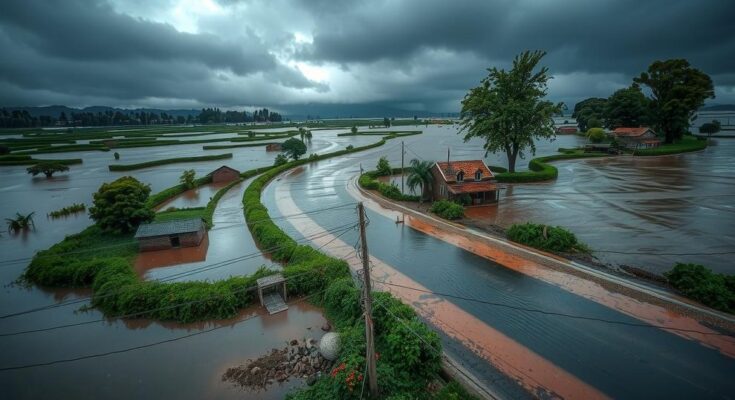Africa is currently facing an unprecedented wave of flooding exacerbated by climate change, affecting millions of residents, particularly in Nigeria’s Kogi State. Severe weather events, including torrential rains, have led to significant losses in life and property, calling for urgent global climate action. Experts warn that without a concerted effort to mitigate greenhouse gas emissions, such extreme weather events will likely worsen in intensity and frequency.
Repeated floods have pounded the home of 67-year-old Idris Egbunu in central Nigeria for over a decade, severely impacting his life as the Niger River inundates his residence after every rainy season. The impact of flooding is particularly dire in Lokoja, Kogi State, where climate change has exacerbated the situation, leading to more intense weather events. According to the United Nations Office for the Coordination of Humanitarian Affairs (OCHA), approximately 6.9 million individuals in West and Central Africa have been affected by severe flooding so far in 2024 alone, reflecting a trend that has grown increasingly alarming since floods first escalated in the region around 2012. Tragically, the flooding crisis culminated in 2022 when Nigeria experienced its most devastating floods in a decade, resulting in over 500 fatalities and displacing 1.4 million people. While this year has not yet matched the severity of those floods, officials warn that the situation remains critical, with an estimated two million people affected in Kogi State alone. Many are left without adequate shelter, like Fatima Bilyaminu, a 31-year-old mother who has lost nearly all her possessions and can only reach her home via boat due to the flooding. Africa, despite being responsible for merely four percent of global greenhouse gas emissions, is disproportionately suffering from climate change effects, which have reshaped rainfall patterns and intensified flooding. Aida Diongue-Niang from the UN Intergovernmental Panel on Climate Change notes that this year has witnessed an exceptional surge in rainfall and extreme weather phenomena, which are indicators of climate change. Furthermore, the Sahel region has recorded unprecedented levels of rainfall, with Niger experiencing up to 200 percent more rain than previous years, endangering vital heritage sites. In Chad, over 576 people lost their lives due to torrential rains, which affected more than 1.9 million of the population. In Cameroon, extensive flooding disrupted the homes of thousands and devastated agricultural land. The aftermath of flooding has been felt across various nations, resulting in disrupted schooling schedules and destroyed infrastructures. Experts, including Clair Barnes from Imperial College London, observed that the previous pattern of cyclical flooding has shifted to one occurring annually, an alarming trend that is expected to worsen without substantial reductions in fossil fuel consumption. As global temperatures continue to rise, extreme weather events are anticipated to escalate in both frequency and severity. Analysts project that by 2030, approximately 118 million impoverished Africans could face the threats of droughts, floods, and extreme heat as climate change progresses. Youssouf Sane of Senegal’s meteorological agency emphasizes the importance of urban planning in light of climate risks. Diong-Yiang argues that addressing these severe weather events necessitates a collective effort to curtail greenhouse gas emissions globally, emphasizing that it is a challenge that encompasses all humanity rather than being solely the responsibility of the affected regions.
The issue of climate change and its ramifications on weather patterns has become increasingly prominent in recent years, particularly in regions such as Africa, where populations are heavily reliant on stable weather for their livelihoods. The rise in severe flooding incidents, particularly in countries like Nigeria and those surrounding the Niger River, signals a dire need for observations and interventions to protect vulnerable communities. With the majority of African nations contributing minimally to global greenhouse gas emissions, the continent remains paradoxically susceptible to the effects of climate change, leading to widespread humanitarian crises. Understanding the dynamics of climate change and its disproportionate impact on developing regions is crucial in framing effective response strategies.
The ongoing flooding crisis in Africa exemplifies the severe impact of climate change, with millions affected annually due to increasingly erratic and intense rainfall patterns. The alarming increase in flooding incidents, particularly in West and Central Africa, necessitates urgent global action to reduce greenhouse gas emissions and address the dire humanitarian implications. Without immediate and sustained efforts to mitigate climate change, communities will continue to face catastrophic impacts, undermining their resilience and survival. The voices of affected individuals underscore the urgent need for collective action to address environmental challenges and prioritize sustainable development in conflict with climate risks.
Original Source: www.barrons.com




